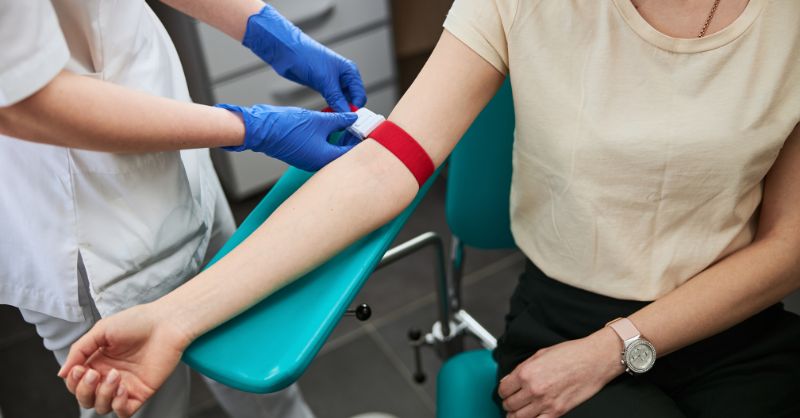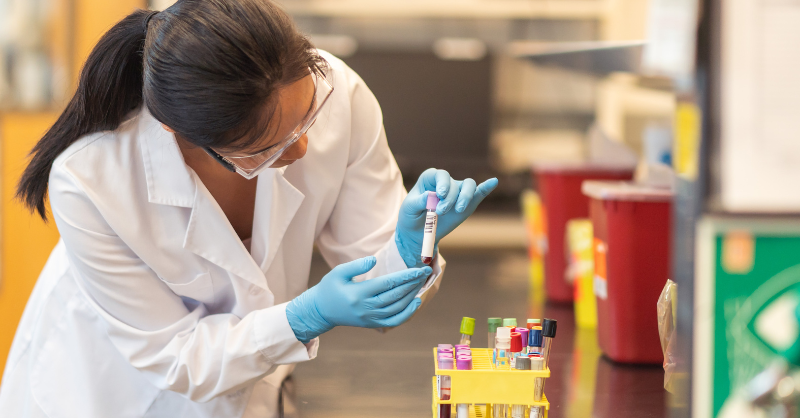
Introduction
A phlebotomist is a trained medical professional who draws blood from the patient’s body for tests and donations or blood transfusions. They collect blood by puncturing the vein and drawing out blood. This process of blood collection is called venipuncture. Along with collecting the blood, a phlebotomist ensures that the samples are correctly labelled and safely transported to the labs. In addition, they have to maintain strict health and safety regulations to prevent disease spread and control infection.
Table of Contents
Similar Job Titles
- Medical Assistants
- Medical Laboratory Technicians
- Science Technicians
- Medical Laboratory Technologists
- Nurse
Did you know?
The word phlebotomy comes from the Greek word ‘Phleps’, which means vain and ‘tomia’, meaning cutting.
Common Job Responsibilities for a Phlebotomist
The main job of a phlebotomist is to collect blood. However, there are other responsibilities you have to fulfil as a phlebotomist. These responsibilities include
- Before collecting the blood, you have to prepare the patients by putting them at ease as the patients may get anxious, or they can have a fear of needles.
- You have to verify the identity of each person and ensure that the labelling is proper to avoid confusion and mistake.
- Sanitising all the tools and instruments before you start the process of drawing blood
- Providing support to those who face difficulties after a transfusion or a blood draw
- Properly maintaining and storing the blood samples and transporting them to labs within a given timeframe
- Following the health and safety regulations and ensuring that the blood is not contaminated

Standard Work Environment
As blood tests are required in a variety of healthcare settings, the phlebotomist workplace includes hospitals, clinics, blood banks, medical labs etc. If they work in a hospital or a clinic, they mainly work in the patient care unit, where they collect blood from the patients. However, sometimes they also work in the hospital or clinic laboratory where they prepare the collected samples for analysis, labelling and storing.
The work setting of the blood bank requires these professionals to collect blood from the donors for donations and evaluate the donor’s eligibility. They are also responsible for maintaining donor records.
As a phlebotomist, you have to work in a high-paced work setting. You have to deal with patients who are not comfortable with needles or blood and can get anxious. In addition, you have to maintain safety regulations in the workplace in order to prevent infection and contamination. All of these components make the work setting a high-pressure environment.
Work Hours
The work hours of a phlebotomist depend on where they are working. Hospitals are open 24/7; therefore, those working in hospitals will work in shifts. Their shift can be at night or in the morning, and the work hours can differ. It all depends on the schedule the hospitals provide for them.
The clinical laboratories have regular work hours. They work from 9 am- 5 pm five days a week, which adds up to 40 hours per week. The same work hours go for blood donation centres. However, blood donation centres are sometimes open on weekends and holidays to provide service to donors who are unable to donate during working days.
There are also mobile phlebotomy service providers. Their work hours are usually 8 hours per day for five days a week. However, the work shifts can differ according to the needs of the clients. Some may work late night, weekends, on-call shifts or early morning.
Employers
- Hospitals
- Clinics
- Clinical Laboratories
- Community Health Centres
- Blood Donation Centres
- Doctors
- Nursing Homes
Workplace Challenges
There are no professionals that do not have any challenges. So, like other professionals, there are a few challenges a phlebotomist has to face. These are
- The work schedule and work environment can become hectic when there are too many patients to collect blood from. On top of that, you have to check the patient’s identification and ensure proper labelling. As a result, your work may feel overwhelming sometimes.
- You have to deal with rude patients who have ill behaviour or may not be patient enough to wait for their turn. Therefore, you have to know how to handle them and control yourself from reacting.
- When you draw blood from an ill person, their blood can have many microorganisms and pathogens. These pathogens can make you sick and put your health on the line. That’s why you must wear proper safety gear and maintain the safety regulations.
- Sometimes it can become difficult to find the vein of the patient, and it can take many attempts to draw out blood.
Unions / Professional Organisations
The National Association of Phlebotomists is an organisation that every current and future phlebotomist should know about. This organisation will help professionals build their networks and provide them with quality training opportunities. It will play a significant role in your career development.

Recommended Qualifications
There are no formal qualifications required to become a phlebotomist. After completing the GCSE or equivalent qualification, you can take a collogue course or training program. Joining formal training will help you develop a fundamental understanding and basic skills. Then you can join as an apprentice in medical labs, clinics or hospitals. Through this apprenticeship, you will receive a practical understanding.
Even though no formal qualification is required, it is a good decision to opt for accredited or certified courses in order to develop a solid foundation and create an impressive resume. There are many online learning platforms that will provide accredited certificates. You can join them, or if you want, you can go for offline training.
In-demand Job Skills
In order to become a proficient phlebotomist, you will need to acquire a few basic skill sets. Here is a list of skills that will help you in your career progression.
- Communication
As a phlebotomist, you have to communicate effectively with the patients, doctors and other professionals involved with the whole process. That is why having good communication skills is a must.
- Data Entry
The responsibility of a phlebotomist includes data entry and data verification of the patients. Therefore, you will have to acquire basic data entry skills.
- Attention to Detail
Drawing the proper amount of blood, labelling, and accurately entering data and other tasks will also require attention to detail.
- Empathy
The patients may get scared or be in discomfort therefore, you have to show them empathy. You need to have the ability to comfort them.
- Hygiene
Unhygienic equipment can cause contamination and infection. On top of that, the blood from the patients can have infectious pathogens that can be harmful to you. Thus, it is important to have proper hygiene skills.
- Stress Management
The work schedule may get hectic, and you can become overwhelmed. That is why you will need the ability to manage stress effectively.

Suggested Work Experience
Work experience is important for almost every job in the medical sector. Having experience in the medical setting will help you understand demands and duties through a practical lens.
You can gain experience through an apprenticeship as a healthcare support worker. Through apprenticeship, you will be able to develop a clear understanding of storing, labelling and transportation process, along with acquiring valuable phlebotomy techniques. You can also take part-time jobs in entry-level positions or volunteer in clinics and hospitals to enhance your knowledge and skills.
Projected Career Roadmap
No matter which sector you work in, you must be hard-working and dedicated. If you keep on working on your skill sets, gain more experience and professional qualifications, you will be able to drive the progress of your career.
After working for a while, you may get promoted to positions such as senior phlebotomist, phlebotomy manager, or team leader. Working as a phlebotomist will also help you decide if you should seek a career in other biomedical jobs. As a certified phlebotomist, you can explore career options like a registered nurse, medical or physician assistant and medical lab technician.
Job Prospects
Individuals with excellent phlebotomy knowledge, communication skills, data entry skills and attention to detail will have good career prospects.
Tips for Professional Development
Here are some tips that will help you climb the career ladder faster.
- Expand Your Knowledge
Enhance your knowledge about the human body and blood pathogens, contamination and other related topics. This will help you establish better communication with patients and also assist you in preventing infection and contamination. It is also essential that you get familiarised with the tools and equipment. The better you understand their use, the more proficient you can work.
- Get Practical Training
For professions like phlebotomy, it is important to have practical knowledge. First-hand training will allow you to have an overall understanding of the work environment and job responsibilities. You can join as an apprentice in medical labs, hospitals, clinics, or blood donation centres to get practical training.
- Build an Impressive Resume
In order to develop a thriving career as a phlebotomist, accredited certificates will play a significant role. You can take online or offline accredited courses that will provide you with a certificate of achievement. Through these certificates, you will be able to prove your expertise in this area and be able to build a good reputation.
Explore More
Average Salary of Phlebotomists in the United Kingdom
In the United Kingdom, the average salary of a phlebotomist is around £23,023 per year. The starting level for phlebotomy jobs pays around £21,054 annually. With more experience, you can earn up to £30,290 per year.
Conclusion
The roles and responsibilities of a phlebotomist can be challenging at times. However, if you have the right skills and knowledge, you will be able to keep everything on track. Therefore, it is vital that you keep on working on your skills and abilities. However, you should not only focus on phlebotomy skills but also other skills such as communication skills, interpersonal skills, time and stress management skills etc. These will help you accelerate your career progression.
- Available Courses
- Career Bundles73
- Animal care5
- Law8
- Quality Licence Scheme Endorsed111
- Teaching13
- Teaching & Academics Primary27
- Accounting & Finance Primary30
- Training3
- Design14
- IT & Software84
- Healthcare126
- Marketing31
- Health and Safety403
- Construction48
- Electronics25
- Hospitality22
- Health and Social Care219
- Child Psychology37
- Management377
- Business Skills268
- First Aid70
- Employability264
- Safeguarding75
- Food Hygiene103
- Personal Development1309
 Food Hygiene
Food Hygiene Health & Safety
Health & Safety Safeguarding
Safeguarding First Aid
First Aid Business Skills
Business Skills Personal Development
Personal Development







